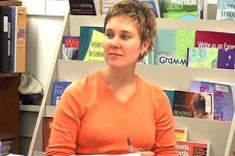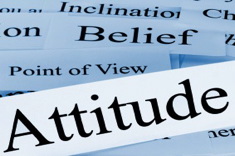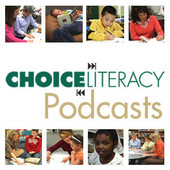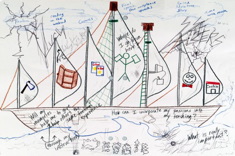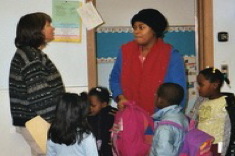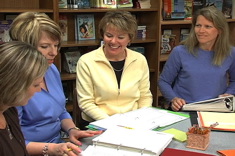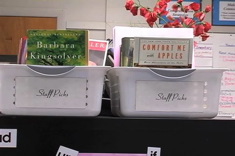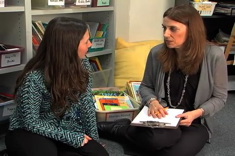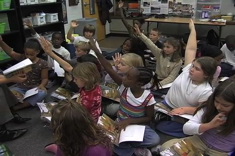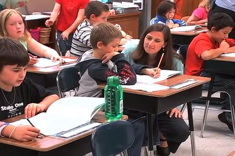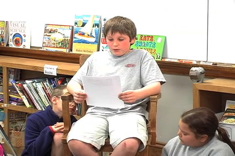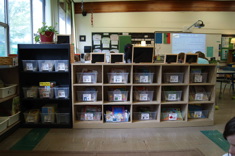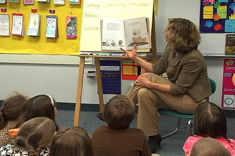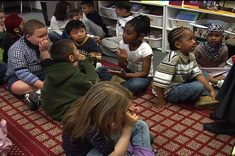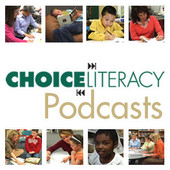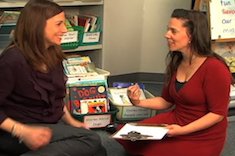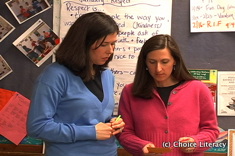New Teacher Mentors
Universities put far more energy into the initial certification of teachers than they do into ongoing support for teachers in the crucial first five years. This "sink or swim" mentality has led to 50% of new teachers leaving the profession in these early years. Glub glub glub - the sound of many of the freshest faces and voices in teaching abandoning schools in discouragement. The development of systematic, thoughtful support programs for new teachers isn't optional; it's essential for the future vitality of schools. We share advice and insight from master teachers as they mentor teachers who are in their first years leading classrooms.
Latest Content
Integrating Student Teachers into Literacy Workshops
Katherine Sokolowski gives advice for integrating student teachers into literacy workshop instruction.
New Teachers: The Power of Inexperience
Sometimes a lack of experience is a gift worth embracing. Michelle Kelly considers all the strengths new teachers bring to schools, from their comfort with technology to genuine enthusiasm.
Evaluating the Literacy Classroom
Jennifer Schwanke remembers the awkward and stressful experience of being evaluated as a young teacher. In her work now as a principal, she’s developed her own criteria for evaluating teachers.
Discussing Observations with New Teachers
Jennifer Allen’s new teacher group discusses what they learn from classroom observations in this video taped early in the fall.
Making Assumptions
The shift from teaching children to mentoring adults can be difficult for many educators. Ellie Gilbert chronicles the biggest assumptions that harm collaborative relationships with colleagues.
Literacy Coaching and Student Work with Diane Sweeney (PODCAST)
Diane Sweeney talks about the importance of focusing more on student work and less on teacher plans and lessons for literacy coaches.
You’ve Got to Be Joking
A first-year teacher struggles to manage a class with boys who are cut-ups. From the lemons to lemonade department, Heather Rader helps him build on student strengths by developing a popular writing unit on joke writing.
Literacy Groundings
Andie works with new teachers as they share their literacy groundings — the moments in their histories that shaped who they are as educators.
On Their Own (Almost): Coaching and Classroom Demonstrations Mid-Year
In this video filmed in mid-January, Jennifer Allen observes new teacher Jessica, and explains how she struggles to redefine her role in the classroom.
Can I Quote You on That?: Capturing Classroom Conversation
Here's a fun notetaking strategy to try. Ellie Gilbert records snippets of conversation from Katie Doherty's students, and then uses them in a debrief session to discuss student strengths, needs, and next steps.
Supporting New Teachers and Appreciating Their Gifts
Melanie Quinn thinks through the two common "phases" of early career teachers, and creates a checklist of guidance they will need from literacy leaders.
Conferring with Parents (Part 2)
In this second installment in the two-part series, Choice Literacy Contributors share their top tips for making conferences with families effective and fulfilling.
Working with Adults: Structuring Effective Conferring
Amanda Adrian connects new learning as a runner to her work with teachers around reading conferences, and shares a model that works.
The Superpower of Reflecting
Are you more of a Pollyanna or Eeyore reflector? Heather Rader takes you inside the questions that help us reflect even more deeply on our instructional practices.
What’s the Evidence?
Heather Rader shares her experiences working with a teacher team led by an outspoken leader. With listening and support, the team examines evidence in a new way.
Virtual Book Clubs for Teachers
It’s virtually possible to get together around a book without getting together at all. Shari Frost shows us how.
Transitioning to Guide on the Side: Facilitating Collaborative Scoring
Heather Rader wants to transition to more of a guide-on-the-side role as she coaches colleagues. Here are some simple strategies she uses to move offstage during collaborative scoring workshops.
Putting the “Mini” Back in Minilessons
We know that the shorter our minilesson, the more time students will have to read and write, but it's not easy for many of us. Shari Frost has tips to shape up minilessons that have become maxilessons.
Keeping Students Front and Center
Jennifer Allen realizes that her biggest fear as a literacy coach is forgetting to keep students at the heart of our coaching conversations. With this in mind, she shares what keeps student learning as her primary focus.
A Class with More Boys Than Girls
Heather Rader coaches a teacher who considers her boy/girl ratio and how it may be affecting students' understanding of directions and time on task.
Acquiring Knowledge Two or Three Strategies at a Time
Amanda Adrian knows that a teachers learning new skills need accurate and timely identification of what's next as support.
Books with Overlooked Potential for Launching the School Year (and Ideas for Using Them with Students)
You know those books that cause us to say, “Aww…I love that book.” Well, the team at Literacyhead has us thinking about using old favorites in new ways.
Favorite Short Mentor Texts for Demonstration Lessons
For teacher leaders who are called upon to do demonstration lessons, here is a “must-have” list of short, potent books.
Lesson Structure: Building a Strong Foundation
Stepping back to think about the design of quality instruction is essential for any teacher. Heather Rader looks to brain research and tried-and-true practices to lay out lesson components.
Whole-Group Share Sessions in Literacy Workshops: Essential Elements
Tammy Mulligan and Clare Landrigan found that even though the group share is the shortest part of the workshop, teachers reported many issues that needed attention. These issues can be resolved with attention to the framework, modeling and more.
Virtually Coaching a Lesson
Coaching cycles look different depending on teachers' needs. Via email and phone, Heather Rader has professional conversations with a teacher as he plans and designs a lesson for observation.
Jennifer Allen on Working with New Teachers (PODCAST)
New teachers need thoughtful support – Jennifer Allen has suggestions on how to provide that assistance in this podcast.
Coaching Out of Chaos: Helping New Teachers Establish Management Systems
The #1 issue for many new teachers is management. Heather Rader shares how she tactfully assisted a novice teacher who needed help.
You Get What You Ask For: The Art of Debriefing
Heather Rader explores the fine art of asking specific questions during coaching debrief sessions.
Relevant Support for New Teachers
Jennifer Allen finds she only learns what new teachers really need when she builds a relationship and rapport with them.
Browse Content By
Type
Category
- Assessment Tools
- Big Fresh Archives
- Booklists
- Choice Numeracy
- Classroom Design
- Common Core
- Community Building
- Conferring
- Content Literacy
- Digital Literacy
- English Language Learners
- Equity
- Family Relations
- Free Samples
- Guiding Groups
- Leadership
- Literacy Coaches
- Mentor Texts
- Minilessons
- New Teacher Mentors
- Podcasts
- Poetry
- Quote Collections
- Reading Strategies
- Self Care
- Struggling and Striving Learners
- Talking and Listening
- Teacher Study Groups
- Teaching Reading
- Teaching Writing
- Word Study and Vocabulary
Author
- Melissa Quimby
- Nawal Qarooni
- Gwen Blumberg
- Julie Cox
- The Lead Learners
- Hannah Tills
- Josie Stewart
- Ruth Metcalfe
- Mallory Messenger
- Becca Burk
- Jodie Bailey
- Vivian Chen
- Mary Brower
- Tiffany Abbott Fuller
- Stephanie Affinito
- Ruth Ayres
- Leigh Anne Eck
- Heather Fisher
- Shari Frost
- Julie Johnson
- Suzy Kaback
- Gigi McAllister
- Shirl McPhillips
- Melanie Meehan
- Cathy Mere
- Debbie Miller
- Tara Barnett and Kate Mills
- Tammy Mulligan
- Dana Murphy
- Bitsy Parks
- David Pittman
- Brenda Power
- Heather Rader
- Matt Renwick
- Mandy Robek
- Christy Rush-Levine
- Gretchen Schroeder
- Jen Schwanke
- Brian Sepe
- Katherine Sokolowski
- Stella Villalba
- Jennifer Vincent
Grade Level
Choice Literacy Membership
Articles
Get full access to all Choice Literacy article content
Videos
Get full access to all Choice Literacy video content
Courses
Access Choice Literacy course curriculum and training




